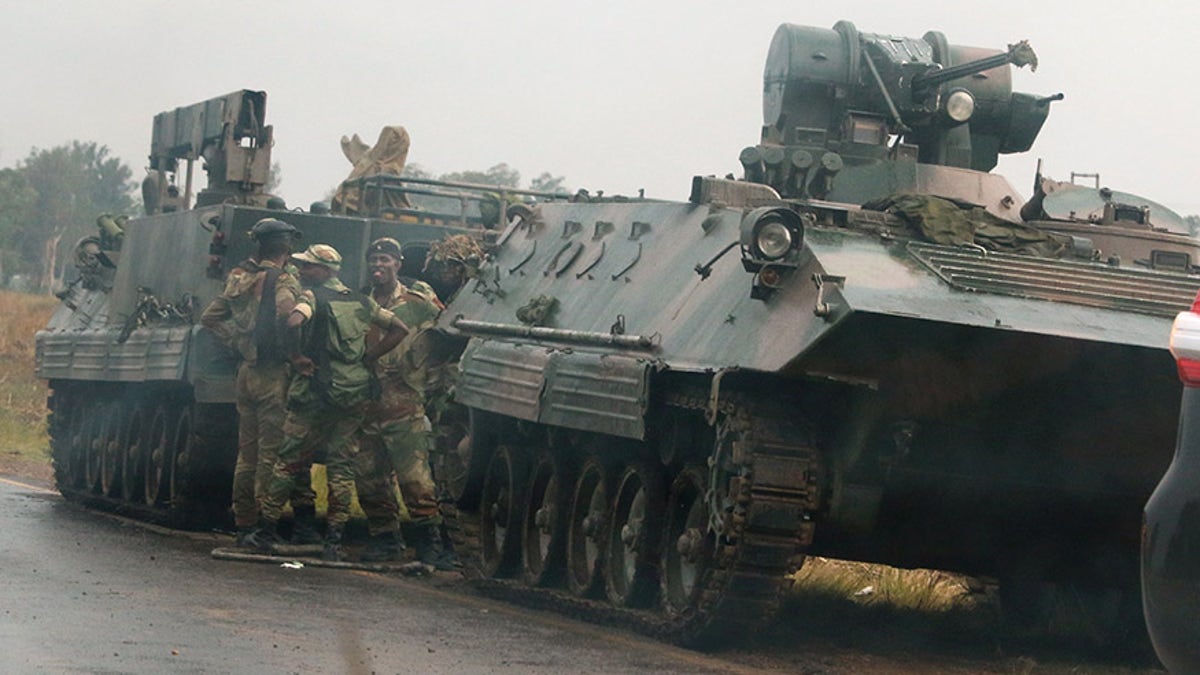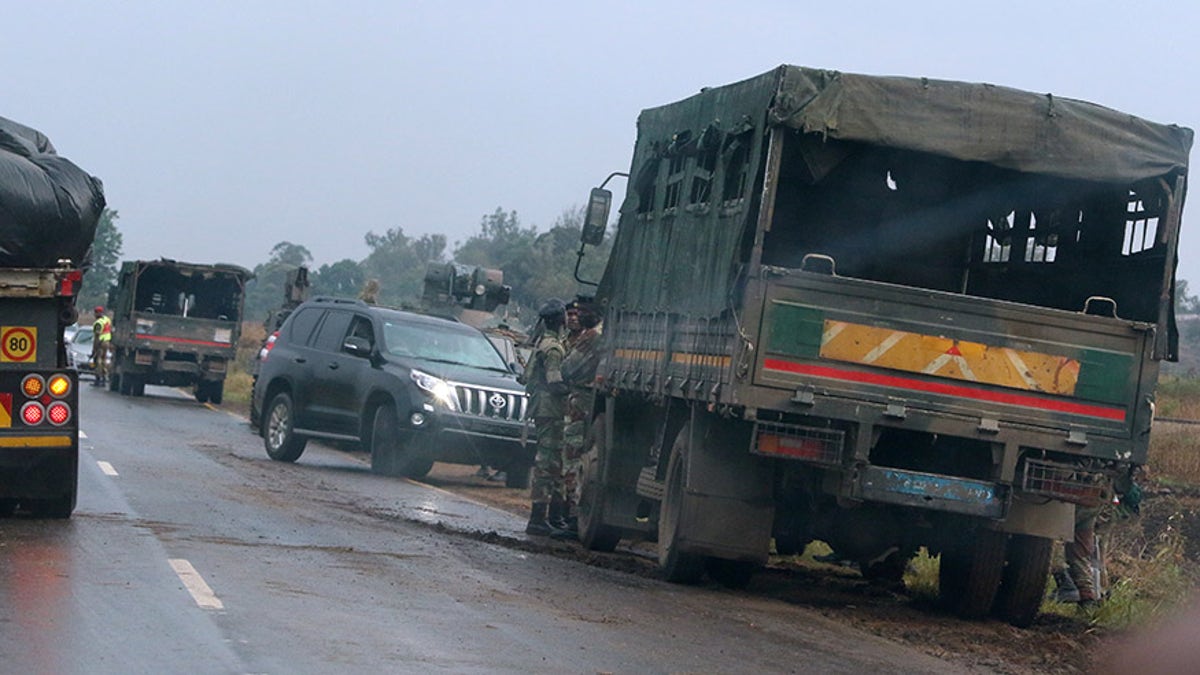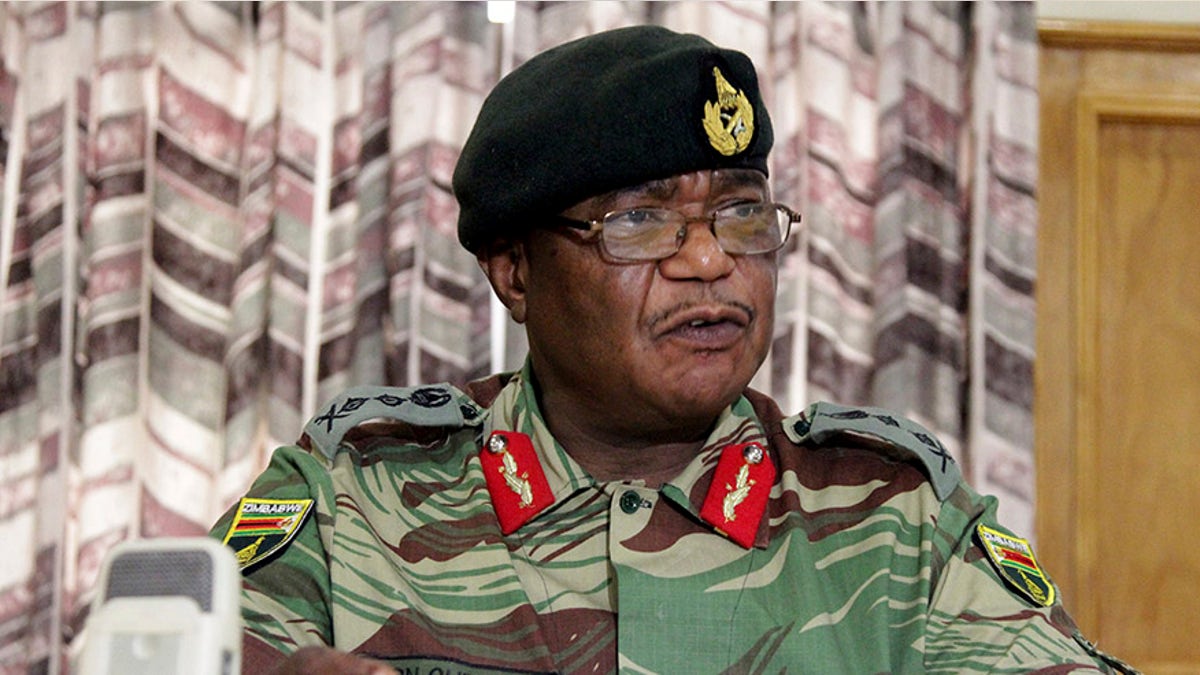
Soldiers stand beside a military vehicle outside Harare, Zimbabwe. (Reuters)
Rising unease and tension appeared to reach a boiling point in Zimbabwe on Tuesday as armored personnel carriers and soldiers were seen heading toward an army barracks just outside the capital city amid rumors a military coup could soon begin.
Witnesses said they saw four armored vehicles head toward the Presidential Guard compound in a suburb called Dzivarasekwa on the outskirts of Harare.
“There were about four tanks and they turned right here, you can see markings on the road,” one witness on the Chinhoyi highway told Reuters.
The move came a day after the military’s commander threatened to “step in” to calm down political tensions after 93-year-old President Robert Mugabe fired his deputy.
Unconfirmed reports on social media seem to claim a military coup is underway in Zimbabwe and that Constantino Chiwenga, the head of the armed forces, has reportedly given Mugabe 24 hours to hand over power.

Military vehicles fill the streets outside Harare, Zimbabwe. (Reuters)
Some political analysts, however, said claims of a military coup are speculative at best.
"Military deployments in Harare not a good sign but think its premature to suggest its even preamble to a coup, especially not one which has been orchestrated to bring [former Vice President Emerson] Mnangwana to power," Ryan Cummings, director of Signal Risk, tweeted.
He continued: "For what it’s worth, no foreign embassies in Zimbabwe have as yet issued any advisories noting unusual troop movements in Harare. Their actions amid uncertain political developments is often best gauge of situation available.”
Hours later, Zimbabwe’s ruling ZANU-PF party said it would never succumb to military pressure, accusing Chiwenga of "treasonable conduct."

Constantino Chiwenga, the head of the armed forces in Zimbabwe, threatened to 'step in' amid growing tensions with President Mugabe. (AP)
They said Chiwenga's actions were "clearly calculated to disturb national peace and stability" and were "meant to incite insurrection."
Frustrations have been brewing in the once-prosperous southern African nation for several months as the economy collapses under Mugabe, the world’s oldest head of state.
The military has been a key pillar in Mugabe’s hold on power since the country gained independence from white minority rule in 1980.
But a rift opened up last week when Mugabe fired Vice President Emmerson Mnangagwa and accused him of plotting to take power -- including through witchcraft.
Mnangagwa, who enjoyed the backing of the military and was once seen as a potential successor to Mugabe, fled the country and said he and his family had been threatened. Over 100 senior officials allegedly supporting him have been listed for disciplinary measures by a faction associated with Mugabe's wife, Grace Mugabe.
In response, Chiwenga openly threatened to intervene, saying purges against senior ruling ZANU-PF party officials linked to the 1970s liberation war should end “forthwith.”
"We must remind those behind the current treacherous shenanigans that when it comes to matters of protecting our revolution, the military will not hesitate to step in," Chiwenga told a packed room of reporters in a prepared statement.
The first lady, whose political profile has risen in the past few years, now appears positioned to replace Mnangagwa at a special conference of the ruling party in December, leading many in Zimbabwe to suspect that she could succeed her husband as president.
Mugabe did not respond to the military statement, and government spokesman Simon Khaya Moyo said only the president could respond. The state-run broadcaster did not report on the statement.
The head of ZANU-PF’s youth wing accused the army chief of subverting the constitution.
“Defending the revolution and our leader and president is an ideal we live for and if need be it is a principle we are prepared to die for,” Kudzai Chipanga, who leads the ZANU-PF Youth League, said at the party’s headquarters in Harare, Reuters reported.
The army spokesman was not immediately available for comment Tuesday. State broadcaster Zimbabwe Broadcasting Corporation was operating as usual and the capital remained calm.
The Associated Press contributed to this report.
